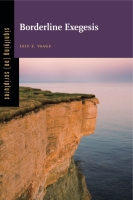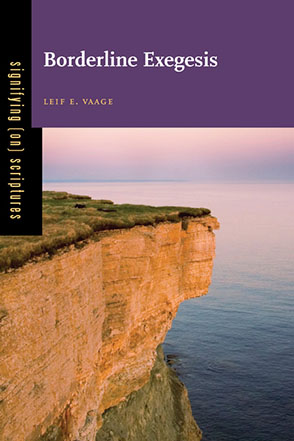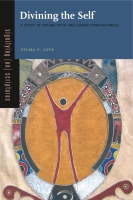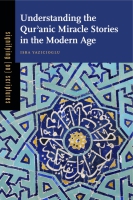Borderline Exegesis
Leif E. Vaage
“With his proposal of a ‘borderline exegesis,’ Leif Vaage challenges traditional biblical scholarship, opening the possibility of reading the Bible with a utopian imagination. Such a reading is a conversation with the biblical texts that takes place in the margins of well-being, where the ‘good life’ cannot be taken for granted and life itself is often threatened. Stimulated by his long-term contact with borderline experiences of life in the outskirts of Lima, Peru, Vaage’s reading of various biblical texts shows how this kind of exegesis can help imagine a better world.”
- Description
- Reviews
- Bio
- Table of Contents
- Sample Chapters
- Subjects
The book’s main chapters comprise four case studies that engage in a “divergent reading” of the book of Job, the Gospel of Matthew, the Epistle of James, and the book of Revelation. Informed by the author’s time in war-torn Peru, these chapters take on themes that the poor and disenfranchised have historically claimed—themes of social justice, the legitimacy (or lack thereof) of prevailing social practices, and, most importantly, utopian demand for another possible world. The chapters are held together by the presentation of a greater theoretical framework that provides reflection on the exegetical practices within and confronts biblical scholars with important questions about the aims of the work they do. Taken as a whole, Borderline Exegesis seeks to disclose what the professional practice of textual interpretation might become if we refuse the conventional distances between academic practice and lived experience.
“With his proposal of a ‘borderline exegesis,’ Leif Vaage challenges traditional biblical scholarship, opening the possibility of reading the Bible with a utopian imagination. Such a reading is a conversation with the biblical texts that takes place in the margins of well-being, where the ‘good life’ cannot be taken for granted and life itself is often threatened. Stimulated by his long-term contact with borderline experiences of life in the outskirts of Lima, Peru, Vaage’s reading of various biblical texts shows how this kind of exegesis can help imagine a better world.”
“Leif Vaage produces a series of daring intellectual border crossings that are shaped by both academic biblical scholarship and his long-standing experience with Latin American Christianity. While never taking his eye off the text, he offers rich biblical readings designed to prod us to think about the larger question of how to know a life worth living. This work will appeal to students of Job, the Matthean Jesus, James, and Revelation. It will also appeal to those interested in the problem of reading the Bible, and living, ethically and politically in these troubled times.”
“Leif Vaage’s ‘borderline exegesis’ works on the edges and in the crevices of biblical texts and biblical scholarship to engage ‘life questions’ that are particularly urgent for those who are living on the edge or on the margins. This edgy and yet balanced book does not assume the Christian triumphalism that has plagued many ‘liberational’ readings of the Bible. I find it accessible and admirable.”
“With Borderline Exegesis, Leif Vaage takes us back to where interpretation started, to the encounter between texts and life. Borderline Exegesis is a significant innovation in biblical exegesis in which the distinction between academic reading of texts and the experience of human life disappears, where the questions of the meaning of texts and the meaning of life are one and the same. Based on encounters from his time in Peru, Vaage moves exegesis from the comfort zone of Western exegetes into the experience of human life in extremis, where reading biblical texts by necessity becomes a work of utopian imagination.”
Leif E. Vaage is Associate Professor of the New Testament at Emmanuel College of Victoria University in the University of Toronto.
Contents
Acknowledgments
Note on the Text
Introduction: Another Bible that Is Borderline
1 Into the Whirlwind: God’s Answer to Job’s Complaint
2 The Economy, Stupid! The Teaching of Jesus in the Gospel of Matthew
Interlude: Displaced Exegete: A Scriptural Biography
3 Such a Little Thing! The Tongue and Alternate Subjectivity in the Epistle of James
4 Interrupting Hope: The Book of Revelation
Conclusion: After the Bible: Life’s Largesse
Notes
Bibliography
Index
Introduction
Another Bible that Is Borderline
—María Eugenia Vaz Ferreira, “Vaso furtivo”
Borderline exegesis is such a toast, “with transitory words . . . in breakable glasses,” to everything that still might augur goodness of life—“light, fleeting, changing, finite”—in the Christian Bible and in us. Borderline exegesis offers homage and encouragement to the yearning that yet lingers there for full existence, however “brief and fragile” this may be, providing succor, if you will, “for itinerants on this transient earth, sombre, raving.” Borderline exegesis thereby seeks to underwrite whatever remains—both in the reader and in the biblical text—“unfinished and alive.”
Not surprisingly, this kind of reading is often called forth and takes place in social contexts where too much already has been declared over and done, or where too many things routinely and prematurely are cut off from thriving. Borderline exegesis seeks to answer some of those hard questions that the ongoing struggle to know a good life frequently poses, often with bitterness and with blood. I remember, for example, a brief conversation that I had more than twenty years ago on a Sunday afternoon with a bone-weary householder in a shantytown north of the international airport in Lima, Peru. Seldom at home, the man typically left his house very early in the morning to travel to his first job, only to return very late every night after his second one, six days a week, fifty-two weeks a year, year after year. He did this in order to earn too little to feed his family, let alone finish the roof, install a toilet, get rid of the rats. At one point in our conversation, the man suddenly asked me, “¿Por qué a mí me ha tocado vivir esto?” In other words: Why do I have to live this kind of life? I had no answer for him at the time. And, unfortunately, I am still without one. Explicitly in chapter 1 of this book, which is a reading of the book of Job, and implicitly in the other chapters, which provide readings of the gospel of Matthew, the letter of James, and the apocalypse of John, I remain haunted by that man’s question with its corollaries. These issues underwrite the intellectual work of a borderline exegesis as practiced in this book. Thus the following essays all aim to enact a peripheral biblical scholarship—one written at the edge of the dominant social body, in the margins of its well-being, toward a horizon of hope, in the still fantastical realm of what yet could be. Through a divergent reading of four well-known biblical works, the book seeks to articulate that still unvanquished desire to know in, with, and under such corpora a more fulsome measure of that which Czeslaw Milosz has described as “that delicious and dangerous thing that has no name, though people call it life.”
Must I comment further on this category of life? Perhaps it will be necessary for those of us whose sense of our own immediate situation does not (yet) include any serious threat to its enduring bodily presence or general well-being. Otherwise I suggest that the reasons are basically self-evident for why another kind of reader might understand a word such as “life” to be a significant point of reference for the work of thinking through the often intractable problems that routinely afflict not a few people on the planet. It is only if and when the reader has been fortunate(?) enough to take his or her own life for granted—as though this were a statement of the obvious and not somehow already a fact seriously in question—that the category of “life” might seem to be a concept too vague to be meaningful. Or is it that the concept is all too clear? Overwhelmingly so? According to Robinson Jeffers, the person who dwells “in pleasant peace and security” may need to seek “a stone / to bruise himself [or herself] on” in order to counteract the death of “the soul in a man [or a woman],” for the soul, he writes, “begins to die” through too much assurance.
In Latin America, where I first published the initial versions of the four main essays in this book, the Christian Bible has always been a site of partisan debate about the legitimacy of prevailing social practices and—even more importantly—a locus of utopian demand for another possible world. The Christian Bible, in other words, has often been taken to signify that “another world is possible” (otro mundo es posible). The four main chapters of the book belong to that tradition of critical-historical conversation “around” the biblical text for the sake of knowing a better life. The rigor of a properly scientific, historical, critical exegesis thereby becomes a mode of social, critical, historical struggle toward an alternative collective reality.
This is not just or even especially a matter of ideology. Rather, at stake in this practice is a vocational question: What exactly does it mean, precisely as a form of social activity, to do biblical scholarship at this time? Or, if you will, more broadly stated: What exactly does it mean to be an intellectual of the humanist variety, reading texts such as the Christian Bible, in transnational, late capitalist, North Atlantic postmodernity?
In contrast to the narrowly professional model of North Atlantic academic (biblical) scholarship that Edward Said has described so well, the style of biblical interpretation developed in this book ideally would register a mode of “organic” intellection, as this kind of activity was first described by the Italian Marxist Antonio Gramsci in 1931, writing from prison to his sister-in-law Tatiana Schucht. Gramsci wrote, “I greatly extend the notion of intellectuals and I do not restrict myself to the current notion which refers [only] to great intellectuals.”
More specifically, Gramsci sought to include within the sacred precinct of intellectual labor other social and technical forms of critical analysis and creative invention as well. At the same time, he made a distinction between what he called the traditional and the organic intellectual. Roughly speaking, the former is equivalent to Said’s postmodern academic professional, while the latter is precisely and properly defined by the attention that such an intellectual pays to matters of public concern and public discourse. “Public,” however, hardly eschews a decidedly partisan commitment to one or another mode of active participation in concrete social struggle, since these social interests and aspirations, with their corresponding “sciences,” necessarily belong to very particular political processes. Thus an organic intellectual would know himself or herself to be embedded in a given social situation and simultaneously trying to think through it “out of” a specific effort to move it “over there” instead of merely continuing to stay “already here,” and this sooner rather than later. Such a mode of intellection thus tends to favor whatever can be gained by the pursuit of analytical leverage and discursive slippage instead of aiming to consolidate knowledge with heightened definition or a more fulsome taxonomy. For the primary purpose of such labor is to enable ongoing “forward” motion by the social body. This could also be stated as a certain collective aperture in the direction of greater corporate vitality, in contrast to more refined “theories” of the status quo or whatever once was.
In this book I therefore generally refuse to become entangled in any number of “theoretical” discussions about the different issues that my borderline exegesis of the Christian Bible obviously presupposes and raises. This is so, however, not because I am in any way opposed to the exercise of “theory” and, more specifically, the task of clarifying how exactly the language that we use to say whatever it is that we think we have to communicate could and should be understood to operate as a system of signifiers. I take such a task to be a permanent obligation of all critical scholarship and, like every other form of good housekeeping, never able to be carried out completely. The relevant question thus becomes: When has enough of this been done? And, sometimes, what does doing this sort of theoretical housekeeping impede? Life being what it is, one simply cannot do everything at the same time. It is impossible, for example, to clean the house and at the same time oneself, or to garden and simultaneously host a dinner party. Similarly it is difficult to think about thinking, which is to say about speech and the language system or language-like regime of which a given utterance or performance is a particular instantiation, which I take to be the work of “theory,” and at the same time to learn how to live well by thinking through and beyond the ruses of such language or discourse, thought, and culture, especially as these are enshrined in a biblical text, which I take to be the work of a borderline exegesis. And since the latter effort is the specific concern of this book, it has seemed to me to be at least a distraction and conceivably a source of considerable confusion to conjoin with its interruptive and inventive practice the metacritical reflexivity that often characterizes an intentionally “theoretical” self-consciousness.
In fact, one of the reasons for pursuing a borderline exegesis is to contest the ostensible virtue of this kind of endless self-reflexivity. A borderline exegesis aims to underwrite instead the possibility of its transcendence—or transgression—through the disclosure of another possible world that lurks within the interstices of whatever we may think we already know about reality, of which the enterprise of “theory” could be the quintessential expression, especially when it aims to argue on behalf of its own inherent impossibility. By contrast, a borderline exegesis anticipates touching a more tangible truth with material meaning as the outcome of a progressive unknowing, however ineffable the ensuing effervescence may become.
At the beginning of the tradition of modern literary criticism, Matthew Arnold claimed that the purpose of such writing about writing ought to be to encourage readers to read once again the original “classic” texts for themselves. Borderline exegesis could be thought to continue such a practice of “classical” exhortation, urging us to read again the biblical text with accompanying commentary, insofar as borderline exegesis hardly claims to replace or even to displace the biblical text as such. Instead, borderline exegesis invites the reader to encounter the Christian Bible anew, helping this reader discern an enduring social significance for the text that otherwise may have become flat or obscure.
For the practitioner of a borderline exegesis, however, the biblical text is never a disembodied, free-floating, purely literary, or even primarily discursive word, as though such a human artifact somehow were able to constitute an intellectual and moral free-trade zone in which the reader could play and “make of it whatever you will.” Instead, the biblical text is taken by the borderline exegete to be, first of all, a singular form of concrete testimony. In other words, it is a vital trace. Attested by a (biblical) text is, minimally, some body’s (or bodies’) erstwhile effort to exist and desire to be explicitly alive. The text is what remains of the life (or lives) that first produced it. The text is, as it were, the bones that endure after the flesh has disappeared—skeletal testimony to the fact that where now the text is, there was once a face (or faces) with lips and voice(s). Taking up the text in order to read it is thus not unlike the practice of secondary burial. The reader gathers together the hard bits left behind by the “dead” and “de-composing” author in order to re-place them within the context of another life that includes this work of rearrangement. This is what it means to claim for the text a voice (or voices). Of course, the text as such is literally mute. It makes no sense without a reader. But the reader acknowledges through the work of interpretation that these signs of an erstwhile striving or longing to exist are not dissimilar to those that now bring the reader to that text.
Thus the biblical text is taken up in the practice of borderline exegesis as a partner in conversation about those things that would be of common concern to both text and reader. Note that the biblical text is taken up here as a partner in a conversation in which the borderline exegete also participates. The biblical text is thus not the only voice that speaks, nor will it always or inevitably be deemed to have the final word. At the same time, as a partner in this conversation, the biblical text will also be given a hearing. And its contribution to the debates that still rage among and within us may yet have a point to make.
Borderline exegesis is “exegesis” as Jonathan Z. Smith describes this kind of intellectual activity: namely, as the reciprocal act of canonical closure. According to Smith, the work of exegesis is the inevitable “flip side” of that frequent and perhaps ubiquitous phenomenon in human cultures which is a socially defined corpus of telling signs, one that is both limited in content and generally held to be authoritative. There is, for example, the African diviner’s customary “set” of auguring elements; or the Jewish tradition of a circumscribed Torah, which was given to Moses once upon a time and subsequently transmitted both in writing and orally across ensuing generations; or the Christian Bible of “holy scripture.” In each case, according to Smith, canonical closure is accompanied by a corresponding set of exegetical practices that enable the culturally inscribed practitioner to continue using the defined “tool kit” under constantly changing circumstances.
Were it not so, such limited sets of cultural instruments necessarily would become swiftly superannuated. Exegesis is the means by which the constrained “text” continues to function as a means for thinking through the multiple quandaries besetting and bemusing us along life’s way, and not infrequently without precedent. In other words, exegesis is the technical term for the mundane and common struggle to “make do” with the social technology at hand—in this case, with the Christian Bible—under prevailing conditions.
Of course, such activity remains compelling, at least as intellection, only if the reader still continues to inhabit the cultural framework responsible for the canonical focus that the work of exegesis presupposes and implies. In modern literary criticism, to inhabit this framework has been called the “suspension of disbelief,” which describes the mode of trust required in order to follow a given story. In the realm of politics, the same practice of consent registers the commitment of citizenship. In love, it denotes a certain willful blindness, or generosity of spirit, without which no relationship endures. In the case of biblical interpretation, however, such a condition of the possibility of exegesis may now stretch modern incredulity beyond its imaginative range. In any case, I am well aware that not everyone will want to do what a borderline exegesis necessarily entails when reading the Christian Bible. And I am not suggesting that everyone must do so—although I will admit that I am somewhat less sanguine about the usual reasons that are given for this refusal.
At least with regard to the persons for whom the essays in this book originally were written, the putative option to refuse the canonical closure of the Christian Bible is tantamount to suggesting that the poor should begin the work of social transformation by no longer considering themselves to be poor—as though this kind of “reframing” were possible or would make any significant difference to their present situation. In fact, the Christian Bible precisely as a canonical text belongs in Latin America to the historical predicament of the bodily poor and socially disenfranchised. It is one of the traditional sources of the organized affliction they have known. For this very reason, an alternative reading of that text provides both a useful and accessible resource in contesting one or another aspect of this harsh reality.
Even so, one may still want to insist on the question: Why continue to read the Christian Bible? Is it ultimately worth the multiple complications and endless entanglements that such a textual practice apparently requires—especially if one no longer wishes to argue for the Christian Bible as the only source of divine wisdom or telling truth, significant knowledge, or any other form of sola scriptura? There is no a priori answer to this question. Obviously, one could choose not to have anything more to do with the Christian Bible. And this could simply be due to a lack of interest in the work, or in order to consider other texts, other voices, other modes of discerning a solution to our evident malaise. Those who choose to do so, however, are unlikely to be reading this book. Nonetheless, their question also haunts these essays. Why bother to read the Christian Bible anymore? For the moment, I can only answer that it may be as good as anything else to think with. And you have to think with something.
Borderline exegesis reads the biblical text historically—although the history that it aims to discover in, with, and under the text is not primarily what was once upon a time somewhere else, but rather what now is, unfolding with the reader before the text, or in front of both the text and the reader(s). In other words, history is for this practice of interpretation, first of all, the presently existing or subsisting reality that encompasses both text and reader always, necessarily, only at this time and place in “the one day” that recurs. This is not to deny, of course, that there ever was another time or place than here and now. At the same time, it is to insist that the history that defines the work of biblical interpretation, at least as borderline exegesis, is principally the history that currently conjoins text and reader within a present. One might wish to call this understanding of history the work of memory, or tradition, or contextualization. None of these terms, however, is adequate to the claim that I am making if and when the use of any one of them aims to keep in play the notion of a past with methodological, epistemological, or ontological priority over the truth of the passing moment.
In order to be as clear as possible, let me therefore repeat that, in a borderline exegesis of a biblical text, the truth of the past is not forgotten or denied. But that past only lives, still, because someone today endures and recalls it—through memory, through imagination, through decipherment and extrapolation—back into the world that we the living currently embody and which embodies us. Thus there is no history that exists “out there” apart from us. There is only the history that we continue to create, which passes through us and which we produce or, if you will, which we reproduce, since we never create this history ex nihilo.
Also of Interest
Mailing List
Subscribe to our mailing list and be notified about new titles, journals and catalogs.






